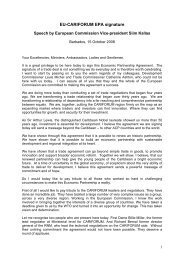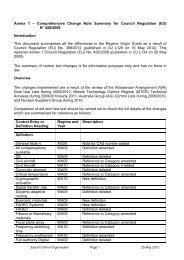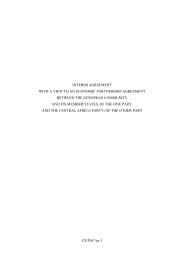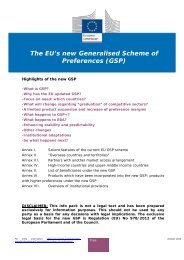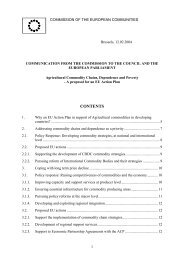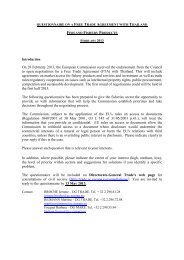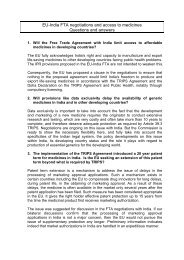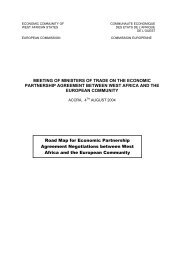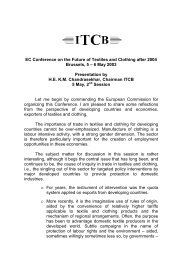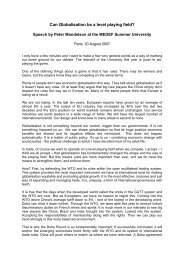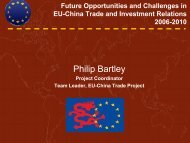Report on the Implementation of the derogation to ... - Trade Websites
Report on the Implementation of the derogation to ... - Trade Websites
Report on the Implementation of the derogation to ... - Trade Websites
You also want an ePaper? Increase the reach of your titles
YUMPU automatically turns print PDFs into web optimized ePapers that Google loves.
Final <str<strong>on</strong>g>Report</str<strong>on</strong>g><br />
RoO Derogati<strong>on</strong> under <strong>the</strong> PACP-IEPA<br />
term gives <strong>the</strong> PACP, o<strong>the</strong>r preference-receiving third countries and EU-based processors<br />
some breathing space in <strong>the</strong> medium term.<br />
• Direct preference erosi<strong>on</strong> through <strong>the</strong> negotiati<strong>on</strong> <strong>of</strong> new free trade agreements (FTAs) by<br />
<strong>the</strong> EU with third country competi<strong>to</strong>rs. For example, if <strong>the</strong> EU were <strong>to</strong> negotiate an FTA with<br />
<strong>the</strong> ASEAN group, or even bilateral agreements with individual states such as Thailand<br />
and/or Vietnam, <strong>the</strong>n <strong>the</strong> PACP and o<strong>the</strong>r third countries would face intensified competiti<strong>on</strong><br />
<strong>on</strong> <strong>the</strong> extra-EU import markets for canned tuna and tuna loins as ASEAN countries would<br />
certainly push for duty-free market access ra<strong>the</strong>r than <strong>the</strong> current GSP preference <strong>of</strong> 20.5%.<br />
• Indirect preference erosi<strong>on</strong> due <strong>to</strong> <strong>the</strong> rising importance <strong>of</strong> FTAs between o<strong>the</strong>r canned tuna<br />
importing countries (e.g. Australia, New Zealand and Japan) and canned tuna supplying<br />
countries (e.g. Thailand). Although PACP countries do not export much canned tuna <strong>to</strong><br />
<strong>the</strong>se markets, <strong>the</strong> increased global market share achieved by tuna supplying countries (e.g.<br />
Thailand) indirectly erodes <strong>the</strong> competitive advantage <strong>of</strong> <strong>the</strong> PACP trade preference as <strong>the</strong><br />
competi<strong>to</strong>r enhances its buying power and ec<strong>on</strong>omies <strong>of</strong> scale enabling it <strong>to</strong> sell more<br />
cheaply <strong>on</strong> EU markets.<br />
7.3 GSP+ Reforms<br />
As part <strong>of</strong> a review <strong>of</strong> its Generalised System <strong>of</strong> Preferences (GSP) regime, <strong>the</strong> EU is c<strong>on</strong>sidering<br />
some reforms <strong>of</strong> <strong>the</strong> GSP+. As detailed elsewhere in this report, <strong>the</strong> duty-free market access that<br />
GSP+ status provides <strong>to</strong> several Latin American countries (especially Ecuador) is an important<br />
dynamic in <strong>the</strong> extra-EU import market for canned tuna and tuna loins. The reform <strong>of</strong> GSP+ includes:<br />
1. The exclusi<strong>on</strong> <strong>of</strong> high- and middle-income developing countries;<br />
2. A new set <strong>of</strong> GSP+ ‘vulnerable’ countries, but <strong>the</strong> proposal does not (yet) formally list new<br />
GSP+ recipients. 344<br />
A potential outcome <strong>of</strong> <strong>the</strong> reform is <strong>the</strong> Philippines graduati<strong>on</strong> <strong>to</strong> GSP+, 345 subject <strong>to</strong> ratificati<strong>on</strong><br />
and implementati<strong>on</strong> <strong>of</strong> <strong>the</strong> 27 c<strong>on</strong>venti<strong>on</strong>s <strong>on</strong> good governance, human rights and <strong>the</strong> envir<strong>on</strong>ment.<br />
This would give this country duty free access <strong>to</strong> <strong>the</strong> EU and threaten <strong>the</strong> positi<strong>on</strong> <strong>of</strong> several third<br />
country suppliers <strong>of</strong> canned tuna, including PNG. For some observers, it may also raise questi<strong>on</strong>s<br />
around Philippine investment in PNG, but it is likely that <strong>the</strong> need for tuna resource access, <strong>the</strong> lure<br />
<strong>of</strong> global sourcing, and MSC certificati<strong>on</strong> will c<strong>on</strong>tinue <strong>to</strong> support medium-term development in<br />
PNG.<br />
It is worth noting also that <strong>the</strong> EU already instituti<strong>on</strong>alised some reforms <strong>of</strong> <strong>the</strong> GSP RoO for fish and<br />
fish products in November 2010. These include <strong>the</strong> following:<br />
1. The requirement that 75% <strong>of</strong> <strong>the</strong> crew were relevant nati<strong>on</strong>als was deleted;<br />
2. The ownership requirement was reduced from <strong>the</strong> prior 75% <strong>to</strong> 50%; and<br />
3. The value <strong>to</strong>lerance method was both simplified and increased from 10% <strong>to</strong> 15%. Note that<br />
<strong>the</strong> 15% value <strong>to</strong>lerance provisi<strong>on</strong> under <strong>the</strong> Cot<strong>on</strong>ou Agreement was rarely used by tuna<br />
processors, but <strong>the</strong> GSP simplificati<strong>on</strong> may increase its utilizati<strong>on</strong> by GSP countries. 346<br />
These relaxati<strong>on</strong>s <strong>of</strong> GSP RoO could significantly benefit <strong>the</strong> Philippines should it graduate <strong>to</strong> <strong>the</strong><br />
GSP+.<br />
344 European Commissi<strong>on</strong>, COM(2011) 241 final.<br />
345 Commissi<strong>on</strong> Staff Working Document 2011.<br />
346 Commissi<strong>on</strong> Regulati<strong>on</strong> (EU) No 1063/2010; Bilal et al. 2011; Campling 2008a.<br />
Linpico s.a.r.l. Page 170




